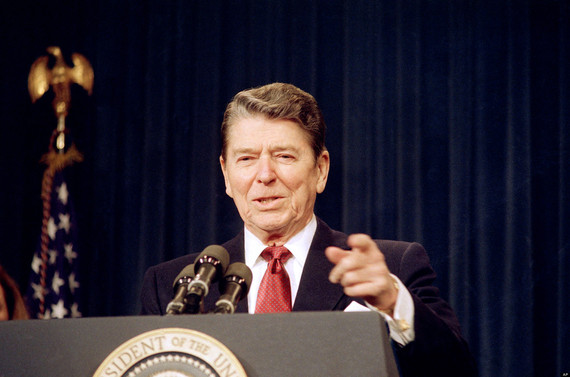
Ted Cruz couldn't settle with a single mention of Ronald Reagan. Speaking at the Texas GOP's convention last week, the blustering Texas Senator used most of his speech to lavish praise on America's 40th President. Even for a conservative Republican, he invoked Reagan with a striking frequency. He quoted Reagan, paraphrased Reagan, and cited the "Reagan Revolution" as the panacea to every problem facing 2014 America.
Many observers would have found Cruz's unremitting Reagan adulation irritating. But the Republican delegates loved it. "I believe in my heart that Ted Cruz is a Ronald Reagan reincarnation that we need to right the course of the nation," argued George Peterson, one convention attendee. With the support of Peterson and like-minded compatriots, the "Ronald Reagan reincarnation" overwhelmingly won the Convention straw poll.
Cruz is no Reagan reincarnation. Philosophically, Reagan supported an assault weapons ban, a pathway to citizenship for undocumented immigrants, and an end to tax loopholes for millionaires, all positions anathema to Texas's Junior Senator and his Tea Party base. Politically, Reagan compromised with Democratic Speaker Tip O'Neil, a stark contrast from Cruz's destructive tactics.
But Cruz's speech misrepresented something far more important about Reagan. Cruz grounded his speech in the myth that Reagan was an optimist. According to Cruz, Reagan ushered in "confidence and optimism... when confronting the world's most difficult challenges." Cruz is not alone in echoing this refrain. Just last week in Time Magazine, Joe Scarborough argued that Reagan leaves behind "a legacy of optimism and common sense." Even President Obama has bought into this narrative; in 2010, Obama asserted, "President Reagan never failed to communicate to the American people [a] sense of confidence and optimism."
Yet there was little confidence and optimism in the Reagan presidency for disadvantaged Americans. Ronald Reagan projected a sense of optimism that excluded numerous groups, notably the poor and racial and sexual minorities. Is optimism for few optimism at all?
Rhetorically, Ronald Reagan denigrated low-income Americans. Consider his own words. Reagan on Americans facing food insecurity: "We were told four years ago that 17 million people went to bed hungry every night. Well, that was probably true. They were all on a diet." Reagan on the homeless: "The homeless... are homeless, you might say, by choice." Reagan on poor families that rely on Medicaid: "A faceless mass, waiting for handouts." Perhaps most egregiously, the "great communicator" manufactured outrageous and stereotypical tales of "welfare queens" abusing the public assistance system. Again and again, his "welfare queen" rants have been debunked as false.
President Reagan showed little fiscal prudence. Government debt soared over his Presidency, thanks to injudicious tax cuts and a massive buildup in military spending. When it came to expenditures to help those in poverty, however, Reagan was remarkably parsimonious. He spared few programs. If the poor relied on it, Reagan cut it. He slashed legal services to the poor, federal assistance to local anti-poverty programs, mental health treatment facilities, drug addiction support programs, housing subsidies through Section 8, employment training, food stamps, and public education. The results were devastating, if unsurprising. Under Reagan, the number of families living under the poverty line surged by one third. For those families, Reagan certainly did not usher in a more hopeful and optimistic future.
Reagan's brand of optimism excluded sexual minorities. As the AIDS epidemic ravaged America, Reagan did nothing. At first, Reagan even said nothing. AIDS had been reported in 1981, but it was not until the final years of his presidency, on March 31, 1987, that Reagan fully acknowledged the crisis and the tens of thousands who had died. According to Edmund Morris, Reagan's authorized biographer, and Lou Cannon, a Reagan biographer, Reagan's response to the crisis was neglectful and ineffective. He shamefully prevented the Surgeon General, Everett Kopp, from comprehensively addressing the crisis. In addition, Reagan refused to endorse condom use and other forms of preventative education, while simultaneously defending federal funding levels that experts considered tragically inadequate. One city at the epicenter of the epidemic, San Francisco, had a larger AIDS budget than Reagan's AIDS allocation for the entire country. As Sean Wilentz noted, Reagan made "political determination" to respond passively to the crisis, in face of opposition to action from the Religious Right.
Instead of offering support and compassion for AIDS patients, Reagan did the converse. Reagan stacked his Administration with deeply homophobic individuals, many of whom believed that AIDS was a rightful punishment for homosexuality. One example was Patrick Buchannan, appointed by Reagan as White House Communications Director. Perhaps Mr. Buchannan's strident antigay philosophy, including his sincere conviction that gays had "declared war upon nature, and now nature is extracting an awful retribution" through the AIDS epidemic, helped him get the job. Another was Reagan's Press Secretary Larry Speakes, who laughed and made an off-color joke about "the gay plague" when questioned about the AIDS epidemic. To one member of Reagan's inner circle, the deaths of thousands of gay men were a source of amusement, not a public health emergency. Reagan even praised and solicited advice from Reverend Jerry Falwell, whom Reagan called a "good friend." According to Falwell, AIDS was "not just God's punishment for homosexuals, it [was] God's punishment for the society that tolerates homosexuals." Although Falwell's rhetoric was widely reported in the press, it did not stop Reagan from inviting Falwell to lead the benediction prayer at the 1984 Republican Convention.
Reagan projected an inclusive form of optimism for certain citizens. Yet Reagan's was far from universal and shut out too many Americans. The narrative that Reagan's Presidency was "hopeful" and "optimistic" overlooks the pain of gay men who lost their partners in the AIDS epidemic. It overlooks the hunger of children who depended on food stamps. It overlooks the laid-off workers who were forced into homelessness. No matter what Ted Cruz says, we should remember the Reagan Presidency for what it really was: years of desperation and misery for millions of our fellow Americans.